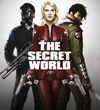This post is part of Critical Distance's Blogs of the Round Table on the topic of "New Horizons".
In the pencil-and-paper roleplaying game Changeling the fae are threatened by the concept of banality. The real world is full of dull rationality which threatens the existence of these fantastical creatures formed from dreams. I imagine delicate fairy wings crumbling at the first sight of a Starbucks. Reality is infected, and fae must act carefully to survive in the mortal world.
Ticketsmiamigardens.net is easy to use for Tickets in Miami Gardens, FL for One Direction, Jazz In The Gardens, Soulfrito Music Festival at Tickets Miami Gardens in Sun Life Stadium.
I find this premise difficult to accept. People aren't some kind of imagination black hole, sucking in anything wondrous and spitting out spreadsheets. Real people are diverse and never stop surprising me. Rationality isn't really a human trait. We try hard for it sometimes, sure, but we're terrible at it. But imagination? Creativity? Call me an idealist, but I'm convinced those exist wherever people are found.
New ideas are not in short supply, but it's easy to forget sometimes because of the difficult parts that happen afterwards. Moving from ideas to product, and then from product to audience. Each step is a bottleneck, limiting the ideas each of us are ultimately exposed to.
The bottlenecks are complicated, but part of the issue is that creativity can be scary. It's unpredictable, and difficult to connect with in its raw form. Children can take a little while to learn to be afraid of it, but among adults creativity is often layered in mystery. It becomes restricted to strange creatures known as artists. These are our fae, possessing that magical spark most of us lack. Except that we don't. Artists are just the people who have worked hard to develop their craft, the places the art comes from are present in everyone.
In this context, I favour pulling the wings off fairies. Not to hurt our favourite game designers, but to humanise them. Demystification, helping to open the way for more people to develop and share their ideas in new ways.
This isn't to say we should stop admiring artistry, far from it. I think appreciating our own creative impulses can make us better able to appreciate the works of others, too. We can learn new ways of experiencing ideas, not just how to create them. We can be better equipped to recognise elements we value and seek them out.
This isn't the sort of frontier some people might be looking for, but I think it's worth talking about. A broad re-evaluation of creativity as something attainable and personally valuable. To be less afraid of new ideas makes more room for new ideas to flourish, simple as that.
Well, no, it's not really so simple. There are many other parts to the bottlenecks. I don't want to get myself down by writing about money or politics, or any of the other reasons creative dreams alone can't see you through. But if you want to explore new territory considering how we view creativity itself isn't a bad place to start.
Making a game doesn't require fairy dust or specific rituals, but if you want them that's okay too. One way people try to make the creative process more palatable is by dressing it up in rules. It's a kind of treasure hunt for the secret keys to unlock creativity and drive games (or other media) forward. Spawning new genres and exploring new subjects. Helping games achieve broader recognition, or more personal relevance.
Commonly used keys become clichés, like "limitations breed creativity", or even "show don't tell". Some keys are social movements with vocal supporters and detractors, like nuanced emotion can only be achieved through photorealism, or games benefit from a wider range of niche perspectives.
All keys work, at least for a certain door. Personally, I'm a big supporter of more diverse authorial voices, feel neutral about limitations or show versus tell, and find the necessity of photorealism patently ridiculous. But there's a full 360 degrees of horizon to explore, not just the direction I happen to be facing.
These perspectives can provide interesting frameworks, sometimes very important frameworks. But I'd be very careful about trying to define one true (or best) direction. The moment you try to draw a box around the source of the most creative, important, or paradigm-shifting works, new ideas are going to fly out from somewhere else and smack you on the ear.
I don't like to speculate too much about future directions in game development. I can identify plenty of gaps. I want more inclusivity, more raw emotion, and more surrealism. I'm sure the world would be a better place if pornographic hidden object games took off. But what I really want is to see people filling gaps I never even noticed were there. The easiest way for that to happen is just to keep on diversifying and pushing boundaries. Our boundaries as creators, and our comfort zones as players.

 Papo & Yo
Papo & Yo
 Dangerous High School Girls in Trouble!
Dangerous High School Girls in Trouble!
 The Secret World
The Secret World
 Jade Empire
Jade Empire

